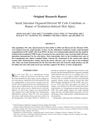 August 2024 in “Drug Design Development and Therapy”
August 2024 in “Drug Design Development and Therapy” Decursin shows promise for treating cancer, neuroprotection, inflammation, and hair loss.
 May 2024 in “International Journal of Nanomedicine”
May 2024 in “International Journal of Nanomedicine” Biodegradable polymers can improve cannabinoid delivery but need more clinical trials.
 January 2024 in “Biochemistry Research International”
January 2024 in “Biochemistry Research International” Compounds from Ziziphus spina-christi roots show strong antibacterial and antioxidant potential.
 June 2023 in “Pharmaceuticals”
June 2023 in “Pharmaceuticals” Men and women respond differently to drugs for COVID-19, high cholesterol, and diabetes, which suggests a need for personalized treatments.
 2 citations,
July 2019 in “PLOS ONE”
2 citations,
July 2019 in “PLOS ONE” Certain genetic variations are linked to higher liver enzyme levels in patients treated for chronic hepatitis C with specific drugs.
 39 citations,
November 2015 in “Nanomedicine”
39 citations,
November 2015 in “Nanomedicine” Improved Finasteride delivery for hair loss treatment.
 January 2018 in “Springer eBooks”
January 2018 in “Springer eBooks” Terbinafine is the most effective medicine for fungal nail infections, especially for diabetics and those with weak immune systems.
1 citations,
October 2023 in “Journal of personalized medicine” Food intake, not genetics, affects how the body processes tadalafil and finasteride.
34 citations,
June 2015 in “Journal of cardiovascular pharmacology and therapeutics” Direct vasodilators and sympatholytic agents are still useful for certain conditions despite being less common due to side effects and newer drugs.
9 citations,
July 2022 in “Journal of Clinical Oncology” Oral paclitaxel plus encequidar improved tumor response and caused less neuropathy but more serious infections than intravenous paclitaxel.
 2 citations,
May 2022 in “Diagnostics”
2 citations,
May 2022 in “Diagnostics” Vitamin D levels in hair don't match those in blood, so hair isn't a reliable indicator of Vitamin D status.
181 citations,
December 2017 in “Trends in immunology” Intestinal intraepithelial lymphocytes are crucial for gut immunity and maintaining the mucosal barrier.
 137 citations,
April 2015 in “Nature Reviews Molecular Cell Biology”
137 citations,
April 2015 in “Nature Reviews Molecular Cell Biology” Different types of stem cells with unique roles exist in blood, skin, and intestines, and this variety is important for tissue repair.
 82 citations,
August 2017 in “Cell Reports”
82 citations,
August 2017 in “Cell Reports” An imbalanced gut and lack of biotin can cause hair loss in mice.
29 citations,
December 1989 in “The journal of nutrition/The Journal of nutrition” Mice's intestinal uptake of pantothenic acid is not affected by dietary levels.
 18 citations,
August 2019 in “Nutrients”
18 citations,
August 2019 in “Nutrients” Eating barley for life may lead to healthier aging in mice.
 13 citations,
January 2015 in “Molecular Pharmaceutics”
13 citations,
January 2015 in “Molecular Pharmaceutics” Minoxidil works well as a high permeability reference drug for biopharmaceutics classification.
 11 citations,
June 2005 in “Stem Cells and Development”
11 citations,
June 2005 in “Stem Cells and Development” Intestinal stem cells can help repair skin damage from radiation.
 8 citations,
January 2008 in “European Journal of Pediatrics”
8 citations,
January 2008 in “European Journal of Pediatrics” Children with autoimmune gastritis showed improved intestinal health over time and should be checked for other autoimmune conditions.
2 citations,
January 2018 in “Elsevier eBooks” Probiotics and dietary changes can help treat acne.
1 citations,
October 2023 in “Animals” A small dose of Platycladus orientalis leaf extract improves raccoon dogs' growth and health, but higher doses can be harmful.
1 citations,
June 2022 in “Pharmaceutics” Minoxidil's absorption is too variable for it to be a reliable reference drug.
 December 2023 in “Curēus”
December 2023 in “Curēus” A woman with lupus had rare severe symptoms but improved with treatment.
 January 2023 in “Discovery immunology”
January 2023 in “Discovery immunology” T cells and bacteria in the gut and skin help maintain health and protect against disease.
 September 2021 in “bioRxiv (Cold Spring Harbor Laboratory)”
September 2021 in “bioRxiv (Cold Spring Harbor Laboratory)” Special gut cells help stem cells move to and fix injured areas by activating a specific signaling pathway.

Pygo2 is important for early growth and progression of intestinal tumors, and could be a target for treating cancers with certain mutations.
54 citations,
June 2018 in “Nutrients” Early diagnosis and a strict gluten-free diet are crucial for children with celiac disease to improve symptoms.
 36 citations,
April 2016 in “British journal of dermatology/British journal of dermatology, Supplement”
36 citations,
April 2016 in “British journal of dermatology/British journal of dermatology, Supplement” A substance called VIP might protect hair follicles from being attacked by the immune system, and problems with VIP signaling could lead to hair loss in alopecia areata.
33 citations,
May 2018 in “Stem Cell Reports” Krt15+ cells in the mouse intestine resist radiation and can start tumors.
 8 citations,
April 2019 in “ACS Biomaterials Science & Engineering”
8 citations,
April 2019 in “ACS Biomaterials Science & Engineering” The new SIS-PEG sponge is a promising material for skin regeneration and hair growth.




















